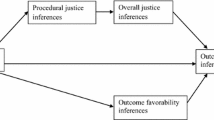Abstract
The present study extends earlier research on procedural unfairness by assessing subjects' reactions to a procedural change before they learn about the outcome of the changed procedure. Subjects performed a series of four tests. After three tests, the procedure to calculate the test scores was changed into a procedure that was very inaccurate or slightly inaccurate compared to what subjects had experienced until then. The very inaccurate procedure was judged as more unfair as the slightly inaccurate procedure. As predicted, the unfair procedure raised negative affect and motivated subjects to protest. Implications of the results for procedural justice theory are discussed.
Similar content being viewed by others
References
Baron, R. M., and Kenny, D. A. (1986). The moderator-mediator variable distinction in social psychological research: Conceptual, strategic and statistical considerations.J. Pers. Soc. Psychol. 51: 1173–1182.
Bies, R. J. (1985). Individual reactions to corporate recuiting procedures: The importance of fairness. Unpublished manuscript.
Crosby, F. J. (1976). A model of egoistical relative deprivation.Psychol. Rev. 83: 85–113.
De Gilder, D., and Wilke, H. (1990). Processing sequential status information.Soc. Psychol. Quart. 53: 340–351.
Earley, P. C., and Lind, E. A. (1987). Procedural justice and participation in task selection: The role of control in mediating justice judgments.J. Pers. Soc. Psychol. 52: 1148–1160.
Folger, R. (1987). Reformulating the preconditions of resentment: A referent cognitions model. In Masters, J., and Smith, W. (eds.),Social Comparison Social Justice, and Relative Deprivation: Theoretical, Empirical, and Policy Perspectives, Erlbaum, Hillsdale, NJ.
Folger, R., and Konovsky, M. A. (1989). Effects of procedural and distributive justice as reactions to pay raise decisions.Acad. Manage. J. 32: 115–120.
Folger, R., and Martin, C. (1986). Relative deprivation and referent cognitions: Distributive and procedural justice effects.J. Exp. Soc. Psychol. 22: 531–546.
Folger, R., Rosenfield, D., and Robinson, T. (1983). Relative deprivation and procedural justifications.J. Pers. Soc. Psychol. 45: 268–273.
Konovsky, M. A., and Cropanzano, R. (1991). Perceived fainess of employee drug testing as a predictor of employee attitude and job performance.J. Appl. Psychol. 76: 698–707.
Leventhal, G. S. (1980). What should be done with equity theory?: New approaches to the study of fairness in social relationships. In Gergen, K. J., Greenberg, M. S., and Willis, R. H. (eds.),Social Exchange Theory, Plenum Press, New York.
Lind, E. A. (1994).Procedural justice, disputing, and reactions to legal authorities, ABF working paper #9403, American Bar Foundation, Chicago.
Lind, E. A., Kanfer, R., and Earley, P. C. (1990). Voice, control, and procedural justice: Instrumental and noninstrumental concerns in fairness judgments.J. Pers. Soc. Psychol. 59: 952–959.
Lind, E. A., MacCoun, R. J., Ebener, P. E., Felstiner, W. L., Hensler, D. R., Resnik, J., and Tyler, T. R. (1990). In the eye of the beholder: Tort litigants' evaluations of their experiences in the civil justice system.Law Soc. Rev. 24: 953–996.
Lind, E. A., and Tyler, T. R. (1988).The Social Psychology of Procedural Justice, Plenum Press, New York.
Thibaut, J., and Wancer, L. (1975).Procedural Justice: A Psychological Analysis, Erlbaum, Hillsdale, NJ.
Tyler, T. R. (1990).Why People Obey the Law: Procedural Justice, Legitimacy, and Compliance, Yale University Press, New Haven, CT.
Tyler, T. R., and Lind, E. A. (1992). A relational model of authority in groups. In Zanna, M. (ed.), Advances in Experimental Social Psychology, Vol. 25, Academic Press, New York, pp. 115–191.
Author information
Authors and Affiliations
Rights and permissions
About this article
Cite this article
Vermunt, R., Wit, A., van den Bos, K. et al. The effects of unfair procedure on negative affect and protest. Soc Just Res 9, 109–119 (1996). https://doi.org/10.1007/BF02198075
Issue Date:
DOI: https://doi.org/10.1007/BF02198075




